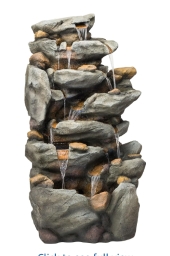
 7
7












 3
3




r ranson wrote:So I put it to you. What is a water garden? What are the limits to say "this is a water garden, that is not"
What differentiates a water garden from a pond?
What are the uses of a water garden? What about a small one?
Does water gardens include fountains, koi ponds, garden ponds, mini-ecosystems...
Do ponds include water gardens, or do you think there's an overlap between the two. Some ponds can be water gardens. Some water gardens aren't ponds.
 3
3























 2
2




r ranson wrote:How about rain gardens? Are they water gardens?
 1
1




Whoah!! Check out this permie deal!! https://permies.com/w/homesteading-bundle?f=232
"The only thing...more expensive than education is ignorance."~Ben Franklin. "We can easily forgive a child who is afraid of the dark; the real tragedy of life is when men are afraid of the light." ~ Plato
 2
2




 2
2











 3
3




Flora Eerschay wrote:Water is the key element of every garden.
I don't think it's good to design a garden around just one element - even the water - as each of them is an ecosystem consisting of all the elements: plants, animals, fungi, soil, air, water, sunlight, etc, all interconnected and interacting with one another.







 1
1




r ranson wrote:Soil is the foundation of my garden. The health of the soil is what makes everything else thrive - or not.
 3
3











 7
7




Whoah!! Check out this permie deal!! https://permies.com/w/homesteading-bundle?f=232
"The only thing...more expensive than education is ignorance."~Ben Franklin. "We can easily forgive a child who is afraid of the dark; the real tragedy of life is when men are afraid of the light." ~ Plato
 6
6




Invasive plants are Earth's way of insisting we notice her medicines. Stephen Herrod Buhner
Everyone learns what works by learning what doesn't work. Stephen Herrod Buhner
 8
8




"How fleeting are all human passions compared with the massive continuity of ducks.“ — Dorothy L. Sayers
 8
8




"How fleeting are all human passions compared with the massive continuity of ducks.“ — Dorothy L. Sayers
 5
5




"How fleeting are all human passions compared with the massive continuity of ducks.“ — Dorothy L. Sayers

 11
11




Blog: 5 Acres & A Dream
Books: Kikobian Books | Permies Digital Market
 5
5




r ranson wrote:Does water gardens include fountains, koi ponds, garden ponds, mini-ecosystems...
I like growin' stuff.
 4
4




Kimi BrownKawa
https://www.brownkawa.com
 5
5




"Also, just as you want men to do to you, do the same way to them" (Luke 6:31)
 7
7




I'm only 65! That's not to old to learn to be a permie, right?
 9
9




“Only when the last tree has been cut down, the last fish been caught , and the last stream poisoned, will we realize we can’t eat money. “
 4
4




 7
7











 5
5




r ransom wrote: As if, water garden is to a pond, as a garden is to a field. Both are soil growing things, but a garden tends to have a different level of human participation in design and upkeep.
Visit Redhawk's soil series: https://permies.com/wiki/redhawk-soil
How permies.com works: https://permies.com/wiki/34193/permies-works-links-threads

|
Get me the mayor's office! I need to tell him about this tiny ad:
Learn Permaculture through a little hard work
https://wheaton-labs.com/bootcamp
|



